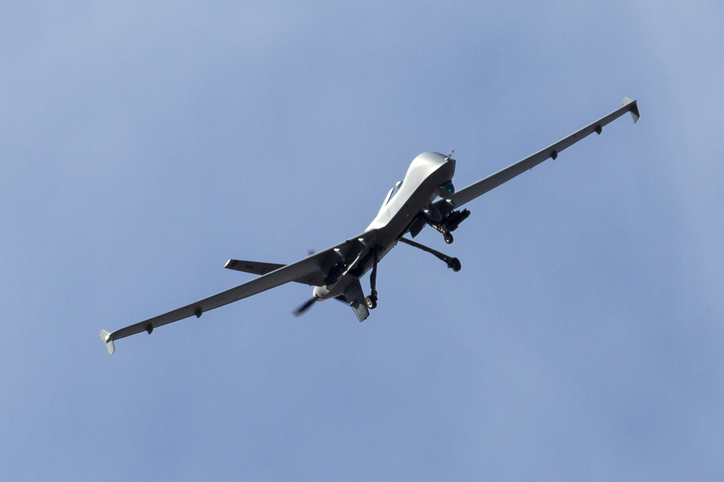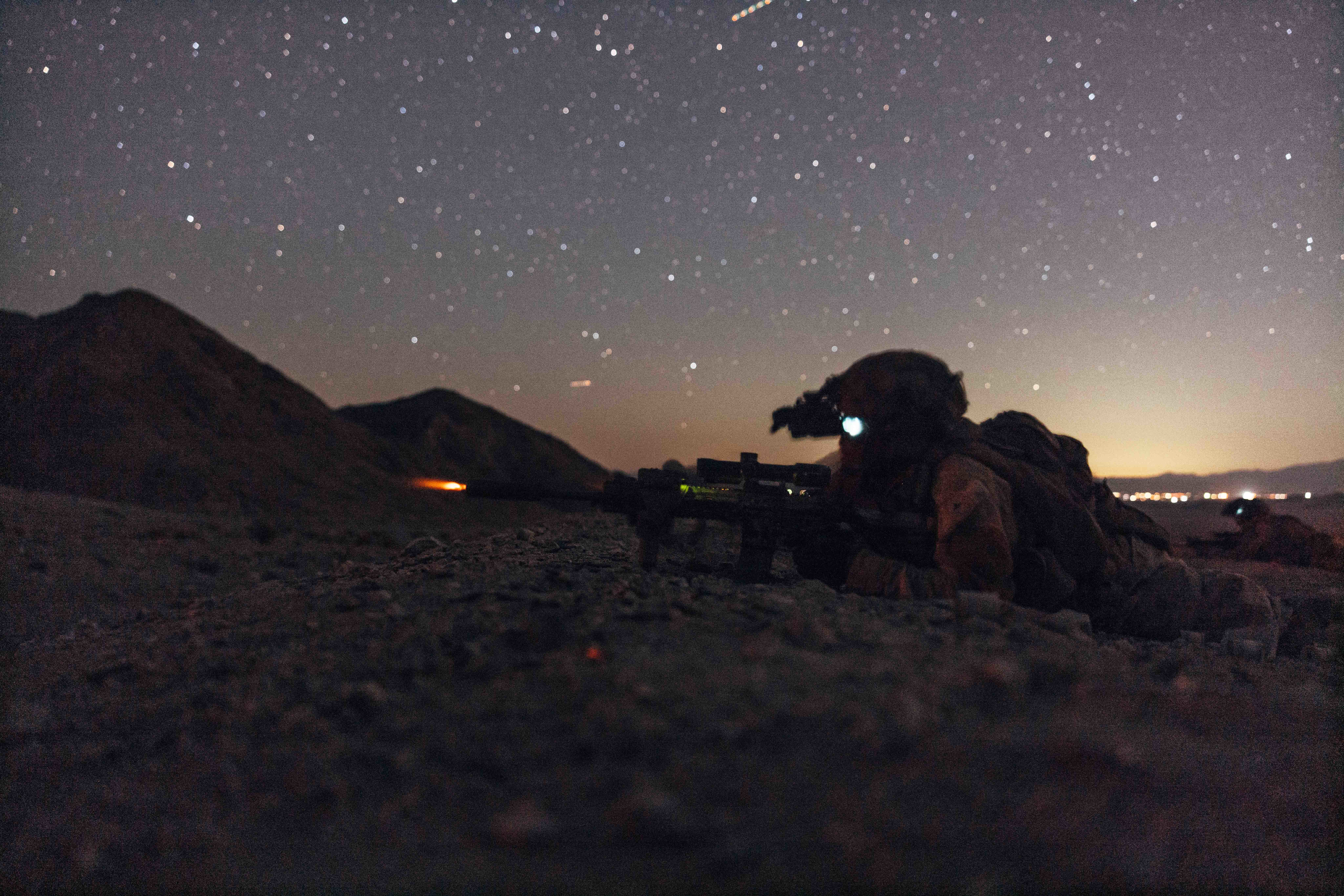
by NETPRAETOR | Sep 2, 2025 | THE DAILY PRAETORIAN
Image Credit: iStock / BlueBarronPhoto | Imagery Disclaimer
Securing Tomorrow: Your Daily Dose of Cyber Safety, Tech Trends, National Defense News, and Inspiration.
“For where no law is, there is no freedom.”
— John Locke
I. National Defense: Key developments in national defense, particularly cyber and technological warfare.
-
U.S. Strikes Venezuelan Drug Boat In The Southern Caribbean (Updated)
-
The U.S. military has carried out its first lethal strike against a Venezuelan drug-smuggling vessel in the southern Caribbean, killing 11 suspected members of the Tren de Aragua cartel, a group designated as a foreign terrorist organization. President Trump confirmed the operation, sharing declassified video of the strike and warning other traffickers to “beware.” Secretary of State Marco Rubio said the targeted vessel was following a common smuggling route and indicated that more operations will follow. This marks a major escalation in U.S. counter-narcotics efforts in the region since warships were deployed earlier this year. Click here to read more.
II. Tech Trends: Updates on emerging technology trends shaping the digital world.
-
Google gets to keep Chrome, judge rules in search antitrust case
-
A federal judge has ruled that Google can keep its Chrome browser despite being found guilty of illegally monopolizing online search, rejecting the Justice Department’s push for a breakup. Instead, Judge Amit Mehta ordered Google to share some search data with rivals and barred it from making exclusive distribution deals, while still allowing it to pay partners like Apple and Mozilla for default placement. The decision marks the most significant antitrust remedies ruling against a tech giant in decades, though critics argue it fails to meaningfully curb Google’s dominance. Google now has the chance to appeal, with the case potentially headed to the Supreme Court. Click here to read more.
III. Inspiration: Articles centered on faith that offer guidance and reflection.
-
Jesus: The most ambitious person to ever walk the Earth
- In this op-ed, Russ Ewell reflects on the dangers of selfish ambition and contrasts it with what he calls “spiritual ambition,” embodied perfectly by Jesus. While selfish ambition leads to brokenness, insecurity, and disorder, Jesus’ ambition was rooted in love and God’s glory, aiming to save the world through humility and sacrifice. Ewell urges readers to follow Christ’s model by rejecting self-centered pursuits, embracing quiet and humble leadership, and devoting energy to building character and serving others. True ambition, he argues, is found in glorifying God and seeking healing for both ourselves and the world. Click here to read more.
IV. Cyber Safety: A focus on the latest cybersecurity threats, tips, or breaches impacting individuals and organizations.
-
PA Attorney General hit by ransomware attack, data impacted still a mystery as court delays continue
- Nearly three weeks after a ransomware attack crippled the Pennsylvania Office of Attorney General, officials say network restoration is underway but remain silent on what data may have been compromised. The breach forced 1,200 staff across 17 offices to switch to manual workarounds, delayed some court cases, and knocked out email, phones, and the agency’s website. While Attorney General Dave Sunday confirmed no ransom has been paid and prosecutions remain on track, concerns linger over whether sensitive legal files were accessed. The full scope of the attack and its impact on state systems is still unclear. Click here to read more.
V. Shield of Israel: Coverage from The Jerusalem Post, providing an Israeli perspective on ongoing conflicts.
-
‘Remnants of Houthi leadership’ are fleeing Sanaa, abandoning residents, Katz says
-
Israeli Defense Minister Israel Katz said Tuesday that senior Houthi leaders are fleeing Yemen’s capital, Sanaa, for fortified hideouts in Saada, Amran, and other areas under their control, following deadly Israeli airstrikes. Katz accused the Houthis of abandoning residents to protect themselves, comparing their actions to Hamas leaders in Gaza and Qatar. Reports from Asharq al-Awsat confirm that top officials, including Mohammed Ali al-Houthi and Abdul Karim al-Houthi, have recently disappeared from the capital, with families evacuated by bus amid fears of further strikes. Click here to read more.

by NETPRAETOR | Aug 29, 2025 | THE DAILY PRAETORIAN
Image Credit: U.S. Department of Defense (DoD) / Photo Illustration by Navy Petty Officer 3rd Class Kenneth Melseth
| Imagery Disclaimer
Securing Tomorrow: Your Daily Dose of Cyber Safety, Tech Trends, National Defense News, and Inspiration.
“There are known knowns… known unknowns… and unknown unknowns.”
— Donald Rumsfeld
I. National Defense: Key developments in national defense, particularly cyber and technological warfare.
-
New Pentagon Task Force Aims To Accelerate Drone Defense At Home And Abroad
-
The Pentagon has stood up Joint Interagency Task Force 401 (JIATF 401) to accelerate counter-drone (C-sUAS) development and fielding, giving its director procurement authority (up to $50M per effort), consolidating RDT&E, absorbing “Replicator 2,” and pulling the Army’s C-sUAS University at Fort Sill under its wing—with a test/training range to be designated in 30 days and a 36-month review set. Framed by Defense Secretary Pete Hegseth as “speed over process,” the push comes amid rising small-UAS threats at home and abroad, but persistent legal limits—especially in the U.S. homeland—still constrain kinetic defenses, keeping the near-term focus on electronic and cyber “soft-kill” options. Click here to read more.
II. Tech Trends: Updates on emerging technology trends shaping the digital world.
-
What’s really happening with the hires at Meta Superintelligence Labs
-
Meta’s “Superintelligence Labs” hiring swirl looks less like an exodus and more like a reorg-and-pause: despite splashy reports, only one active member of the elite “TBD Lab” has departed, two never started, and other exits came from elsewhere in the broader org. After a costly Scale AI stake and a wave of marquee hires (many from OpenAI), Meta has imposed a temporary, budget-planning hiring freeze—exceptions for “business critical” roles—while restructuring around four teams: the small, high-visibility TBD Lab (training/scaling frontier models), FAIR as an innovation feeder, Products & Applied Research to tie research to user features, and MSL Infra for GPUs, data, and tooling. Leadership insists investment is ramping, with some model efforts (like Behemoth) sidelined in favor of newer runs as Meta chases superintelligence with consumer-first goals. Click here to read more.
III. Inspiration: Articles centered on faith that offer guidance and reflection.
-
J.D. Vance Defends Prayer after MSNBC Host Mocks Christians Responding to Church Shooting
- Vice President J.D. Vance rebuked MSNBC host and former White House press secretary Jen Psaki after she dismissed “thoughts and prayers” following the Minneapolis Catholic school shooting that killed two children and injured 17. Vance argued prayer is a source of comfort and a catalyst for action, asking why anyone would attack people for praying amid grief. Current White House press secretary Karoline Leavitt also called Psaki’s remarks insensitive to millions of believers, while Minneapolis Mayor Jacob Frey said the moment required more than prayers, noting the victims were praying when attacked. Authorities say the suspected shooter, 23-year-old Robin (Robert) Westman, died by suicide at the scene; motives remain unknown as investigators execute multiple search warrants and recover additional firearms. Click here to read more.
IV. Cyber Safety: A focus on the latest cybersecurity threats, tips, or breaches impacting individuals and organizations.
-
Taco Bell AI drive-thru rollout stalls after trolls order 18,000 water cups
- Taco Bell’s voice-AI drive-thru pilot—live in 500+ stores since 2023 with over 2 million orders—hit a snag after a viral troll ordered 18,000 water cups, exposing reliability gaps and prompting the chain to rethink rollout. Chief Digital Officer Dane Matthews says Taco Bell is shifting to “hybrid” lanes where staff monitor and jump in during peak times, using AI as assistive support rather than full automation. The episode spotlights both the promise of faster service and the pitfalls of prankable, imperfect AI at the speaker box. Click here to read more.
V. Shield of Israel: Coverage from The Jerusalem Post, providing an Israeli perspective on ongoing conflicts.
-
IDF invasion of Gaza City could be on the way, military ends protection for aid groups in area
-
The IDF signaled a major escalation on Friday by declaring Gaza City a “full-fledged war zone,” ending the special protection it had granted humanitarian groups in the area for the past month. While localized ceasefires remain in place in al-Muwasi and parts of central and southern Gaza, the move suggests an invasion of Gaza City may be imminent. The military has been urging civilians to evacuate with limited success, as it intensifies operations across the Strip—eliminating Hamas operatives, destroying command posts, and consolidating control in Khan Yunis. This shift marks a possible turning point in Israel’s campaign to dismantle Hamas’s infrastructure. Click here to read more.

by NETPRAETOR | Aug 28, 2025 | THE DAILY PRAETORIAN
Image Credit: U.S. Department of Defense (DoD) / Courtesy Photo | Imagery Disclaimer
Securing Tomorrow: Your Daily Dose of Cyber Safety, Tech Trends, National Defense News, and Inspiration.
“To conquer the command of the air means victory; to be beaten in the air means defeat and acceptance of whatever terms the enemy may be pleased to impose.”
— Giulio Douhet
I. National Defense: Key developments in national defense, particularly cyber and technological warfare.
-
YFQ-42 ‘Fighter Drone’ Collaborative Combat Aircraft Has Flown For The First Time
-
General Atomics’ YFQ-42A “fighter drone” has completed its first flight, marking a major milestone in the U.S. Air Force’s Collaborative Combat Aircraft (CCA) program. Developed in just 16 months from contract to flight, the YFQ-42A—derived from the XQ-67A experimental drone—will compete with Anduril’s YFQ-44A, which is slated to begin testing soon. The Air Force plans to choose between the two designs for Increment 1 production in FY2026, with an initial buy of 100–150 drones and a long-term goal of fielding over 1,000 CCAs. Seen as essential for future conflicts, especially against China, the program aims to expand reach, flexibility, and lethality through human-machine teaming. Click here to read more.
II. Tech Trends: Updates on emerging technology trends shaping the digital world.
-
Microsoft AI launches its first in-house models
-
Microsoft has unveiled its first in-house AI models: MAI-Voice-1 and MAI-1-preview. The MAI-Voice-1 speech model can generate a minute of audio in under a second using just one GPU and already powers features like Copilot Daily’s AI news recaps and podcast-style explainers. Users can also try it in Copilot Labs, adjusting voice and speaking style. Meanwhile, MAI-1-preview—trained on 15,000 Nvidia H100 GPUs—offers a text-based model for following instructions and providing helpful responses, giving a glimpse of Microsoft’s future consumer-focused AI inside Copilot. The company says its goal is to build specialized models tailored to everyday users rather than solely enterprise cases. Click here to read more.
III. Inspiration: Articles centered on faith that offer guidance and reflection.
-
Christian Leaders React to Minneapolis Catholic School Shooting
- After the tragic shooting at Annunciation Catholic School in Minneapolis, where two children were killed and 17 wounded, Christian leaders across denominations responded with grief, prayer, and calls to trust God in suffering. Pastor Greg Laurie called the attack “pure evil,” answering the shooter’s mocking question, “Where is your God?” with Psalm 34:18: “God is with the suffering.” Franklin Graham urged prayer for grieving families and the wounded, while Pope Leo XIV sent condolences and an apostolic blessing to the community. Pastors Jack Graham and Samuel Rodriguez also pointed to God’s presence in tragedy, with Graham sharing his own experience of loss and Rodriguez pledging to “double down on prayer” for children’s protection. Click here to read more.
IV. Cyber Safety: A focus on the latest cybersecurity threats, tips, or breaches impacting individuals and organizations.
-
Hundreds of Swedish municipalities and regions are down because of a cyberattack
- A massive ransomware attack on Swedish IT provider Miljödata has crippled services across roughly 200 municipalities and regions, exposing large amounts of sensitive personal data, including medical records, rehabilitation plans, and workplace injury reports. Impacted areas include Region Gotland, Halland, Kalmar, Umeå, Luleå, Kiruna, and others. Authorities say systems were isolated to contain the breach, while police and the Swedish data protection authority investigate. Civil Defense Minister Carl-Oskar Bohlin confirmed the government’s involvement and hinted at a forthcoming cybersecurity law to tighten requirements. No group has claimed responsibility, though attackers are reportedly demanding 1.5 bitcoin (~€144,000). Click here to read more.
V. Shield of Israel: Coverage from The Jerusalem Post, providing an Israeli perspective on ongoing conflicts.
-
WATCH: Smotrich outlines plan to defeat Hamas, end Gaza war by 2026
-
Israeli Finance Minister Bezalel Smotrich laid out a hardline plan to defeat Hamas and end the Gaza war by 2026, insisting “the state of Israel will not surrender to Hamas.” At a press conference, he said victory requires isolating Hamas from “their weapons, their money, their people, and their land,” while tightening the IDF’s control on the ground. Smotrich called for an ultimatum—Hamas must surrender by releasing hostages, disarming, and exiling leaders, or face continued war. He further urged permanent Israeli control of Gaza, including a security perimeter and “voluntary immigration.” He framed the strategy as essential for Israel’s security, justice for victims, and the defense of the Western world. Click here to read more.

by NETPRAETOR | Aug 27, 2025 | THE DAILY PRAETORIAN
Securing Tomorrow: Your Daily Dose of Cyber Safety, Tech Trends, National Defense News, and Inspiration.
“Knowledge itself is power.”
— Francis Bacon
I. National Defense: Key developments in national defense, particularly cyber and technological warfare.
-
Navy P-8 Poseidon Carrying Secretive Radar Pod Seen In Russian Fighter’s Intercept Video
-
A new cockpit video from a Russian Flanker-series fighter shows it intercepting a U.S. Navy P-8A Poseidon over the Black Sea, notably with its rare AN/APS-154 Advanced Airborne Sensor pod deployed on the Special Mission Pod Deployment Mechanism—providing an unusually clear look at the powerful AESA radar used for MTI and SAR targeting over land and sea. The sighting underscores the P-8’s expanding intelligence role in one of Europe’s tensest theaters, where its AAS-equipped configuration offers long-range detection, high-quality radar imaging, and data-sharing for standoff targeting—capabilities that help replace retiring EP-3Es and complement other NATO ISR platforms amid frequent Russian intercepts. Click here to read more.
II. Tech Trends: Updates on emerging technology trends shaping the digital world.
-
Microsoft’s Copilot AI is now inside Samsung TVs and monitors
-
Microsoft’s Copilot AI is making its way to living rooms, debuting on Samsung’s 2025 lineup of TVs and smart monitors. Built into Tizen OS, Copilot appears as a playful animated character that can give spoiler-free episode recaps, suggest movies, and answer general questions. Users can launch it with a voice command or their remote, and signing in enables personalized responses that remember past conversations and preferences. The rollout includes Samsung’s Micro RGB, Neo QLED, OLED, The Frame Pro, The Frame, and M7–M9 monitors, with LG TVs also set to receive Copilot in the future. Click here to read more.
III. Inspiration: Articles centered on faith that offer guidance and reflection.
-
Christian Apologist Wesley Huff Reflects on Family Hardships and God’s Faithfulness
- Christian apologist Wesley Huff, Central Canada director at Apologetics Canada, reflected on a year marked by both public opportunities and personal trials, crediting God’s sovereignty through it all. After gaining national attention from his January appearance on the Joe Rogan podcast, Huff and his family faced a series of hardships, including his wife’s difficult pregnancy, two medical emergencies with their children, and the challenges of moving homes amid his busy ministry and academic commitments. Despite the chaos, Huff emphasized God’s provision and the support of his church community, noting that whether on global platforms or in hospital rooms, he has seen God’s hand guiding every step. Click here to read more.
IV. Cyber Safety: A focus on the latest cybersecurity threats, tips, or breaches impacting individuals and organizations.
-
Claude launches Chrome extension allowing AI to control your browser
- Anthropic has begun testing a new Chrome extension that allows its AI assistant, Claude, to actively browse the web—clicking links, filling forms, and even managing calendars. The pilot program includes 1,000 paying users on a waitlist, with the goal of studying how Claude handles real-world browsing. While the feature promises greater utility, it also raises cybersecurity concerns, particularly around prompt injection attacks, where hidden malicious instructions trick the AI into harmful actions. In trials, Claude executed such attacks nearly a quarter of the time when unprotected, though new safeguards have significantly reduced the risk. Anthropic cautions that vulnerabilities remain, so the tool isn’t yet ready for general release. Click here to read more.
V. Shield of Israel: Coverage from The Jerusalem Post, providing an Israeli perspective on ongoing conflicts.
-
Netanyahu: Oct. 7 ‘probably’ wouldn’t have happened if Trump were president
-
In a podcast interview, Prime Minister Benjamin Netanyahu said Hamas’s October 7 attack “probably” would not have happened if Donald Trump had been president, arguing that Iran would have been “more careful” under his leadership. Netanyahu contrasted Trump’s approach with that of President Biden, claiming Biden’s administration threatened an arms embargo and warned against Israel entering Rafah, though he acknowledged Biden’s initial strong support after the massacre. He stressed Israel would fight “with its fingernails” if necessary, comparing leaving Hamas battalions intact to allowing Nazis to remain in Berlin. Netanyahu also touched on Jewish history, America’s global role, and confirmed his recognition of the Armenian Genocide. Click here to read more.

by NETPRAETOR | Aug 26, 2025 | THE DAILY PRAETORIAN
Securing Tomorrow: Your Daily Dose of Cyber Safety, Tech Trends, National Defense News, and Inspiration.
“People, ideas, hardware—in that order.”
-John Boyd
I. National Defense: Key developments in national defense, particularly cyber and technological warfare.
-
F/A-XX Next Generation Naval Fighter Selection Could Still Happen
-
The U.S. Navy’s “Air Boss,” Vice Adm. Daniel Cheever, says he’s still “eagerly awaiting” an F/A-XX down-select even after the Pentagon froze the program to avoid competing with the Air Force’s F-47 NGAD effort; senior leaders and some in Congress continue to push F/A-XX as vital to future carrier air wing air superiority and a timely replacement for Super Hornets and Growlers. Meanwhile, Cheever sees the MQ-25 Stingray as a near-term game-changer: first flight expected this year and IOC targeted for FY27, freeing 20–30% of Super Hornet sorties from tanker duty, extending carrier reach, and opening the door to broader manned-unmanned teaming, added ISR, and potential follow-on roles alongside future Collaborative Combat Aircraft. Click here to read more.
II. Tech Trends: Updates on emerging technology trends shaping the digital world.
-
Matter Is Finally Ready to Deliver the Smart Home It Promised
-
After years of hype, delays, and criticism, the Matter smart home standard is finally stabilizing with improvements in reliability, setup, and compatibility. Version 1.4 of Thread—the low-power, long-range networking protocol that underpins Matter—has streamlined device onboarding, strengthened cloud access, and improved cross-brand mesh networking. Industry leaders admit the early rollout suffered from high expectations, limited devices, and developer hurdles, but now see Matter reaching the point where both tech enthusiasts and casual consumers can benefit. With backing from Apple, Google, Amazon, Samsung, and others, Matter is poised to deliver on its promise of a unified, brand-agnostic smart home ecosystem. Click here to read more.
III. Inspiration: Articles centered on faith that offer guidance and reflection.
-
European church leaders call for a just peace in Ukraine
- European church leaders are urging political leaders to act decisively to end the war in Ukraine, calling for a “just and lasting peace” in the face of what they describe as “territorial greed.” The Conference of European Churches (CEC), led by Archbishop Nikitas, pledged continued solidarity, prayer, and humanitarian support, while affirming Ukraine’s right to defend its sovereignty. The appeal comes as global churches joined in prayer for peace and amid tense U.S.-Russia talks, with President Trump pressing Vladimir Putin to negotiate directly with Ukrainian President Volodymyr Zelensky. Putin has demanded Ukraine cede Donetsk and Luhansk, while Trump has threatened sweeping sanctions if Russia fails to show progress. Click here to read more.
IV. Cyber Safety: A focus on the latest cybersecurity threats, tips, or breaches impacting individuals and organizations.
-
ChatGPT leak reveals people will share everything with AI
- A recent leak has revealed just how much people are willing to share with AI chatbots — and how risky that can be. At the start of August, thousands of ChatGPT conversations, some containing personally identifiable information like names, addresses, and ID numbers, were found indexed on Google. Researchers analyzing the leaked data found discussions ranging from education and law to deeply sensitive topics like mental health struggles, relationships, and financial issues. Experts warn that such oversharing poses real-world dangers, including identity theft, fraud, and blackmail, especially given the lack of strict privacy protections for AI services. Elon Musk’s Grok chatbot faced a similar incident, with over 370,000 user conversations exposed, some involving private files and even prohibited content. The leaks highlight the urgent need for stronger safeguards — and greater caution from users when engaging with AI. Click here to read more.
V. Shield of Israel: Coverage from The Jerusalem Post, providing an Israeli perspective on ongoing conflicts.
-
Was Mossad involved in getting Iran booted out of Australia? – analysis
-
An analysis suggests Israeli intelligence—potentially the Mossad and Unit 8200—may have aided Australia in uncovering an IRGC-linked plot behind antisemitic attacks, precipitating the expulsion of Iranian officials and the shuttering of Tehran’s embassy in Canberra. While Jerusalem is silent amid strained Israel–Australia ties, the piece cites Israel’s past role in foiling the 2017 Etihad airliner plot (later acknowledged by both Netanyahu and Australia’s home affairs minister) and notes a post–Oct. 7 surge in thwarted Iranian operations targeting Israelis and Jews worldwide. Given the political sensitivities, any cooperation may remain undisclosed, as Israel often works overtly or clandestinely with foreign services—even in countries not aligned with it—to stop attacks on their soil. Click here to read more.

by NETPRAETOR | Aug 25, 2025 | THE DAILY PRAETORIAN
Image Credit: U.S. Department of Defense (DoD) / Marine Corps Lance Cpl. Micah Thompson | Imagery Disclaimer
Securing Tomorrow: Your Daily Dose of Cyber Safety, Tech Trends, National Defense News, and Inspiration.
“To be prepared for war is one of the most effectual means of preserving peace.”
— George Washington
I. National Defense: Key developments in national defense, particularly cyber and technological warfare.
-
Trump, Hegseth float renaming Defense Department to Department of War
-
President Trump and Defense Secretary Pete Hegseth are pushing to rename the Department of Defense back to its original title, the Department of War—a name the U.S. used until 1947. Trump argued the current name sounds “weak,” insisting the U.S. military should stand for both offense and defense, while Hegseth said a formal change is “coming soon.” However, the move may require congressional approval, since the Defense Department’s creation stemmed from the National Security Act of 1947. The proposal comes amid broader Trump-era efforts to reshape federal agencies and expand active-duty troop levels. Click here to read more.
II. Tech Trends: Updates on emerging technology trends shaping the digital world.
-
Elon Musk’s xAI is suing OpenAI and Apple
-
Elon Musk’s xAI and X Corp. have filed a lawsuit against Apple and OpenAI, accusing them of anticompetitive practices tied to Apple’s integration of ChatGPT into the iPhone. The suit alleges that Apple’s partnership with OpenAI locks out rivals by making ChatGPT the default chatbot in Apple Intelligence while sidelining competitors like Grok in App Store rankings and recommendations. Musk argues this “monopoly moat” unfairly gives OpenAI access to billions of potential user prompts, stifling innovation. Apple and OpenAI have dismissed the claims, with OpenAI calling it part of Musk’s pattern of harassment. Click here to read more.
III. Inspiration: Articles centered on faith that offer guidance and reflection.
-
Ex-Disney Animator Departed over Faith Clash, Now Directs Jesus Film ‘Light of the World’
- Former Disney animator Tom Bancroft, who worked on classics like The Lion King and Mulan, left the studio after faith-based elements were increasingly unwelcome in projects and is now co-directing Light of the World, a new animated film about Jesus. Created in a hand-drawn 2D style reminiscent of Disney’s 1990s era, the film tells Christ’s story through the eyes of a young Apostle John and spans from Eden to the resurrection. Set to release in theaters on September 5, the project aims to serve both families and global mission fields, offering what Bancroft calls a long-awaited tool for faith-based storytelling. Click here to read more.
IV. Cyber Safety: A focus on the latest cybersecurity threats, tips, or breaches impacting individuals and organizations.
-
Why Palantir’s success story is also a warning about government surveillance
- Palantir Technologies has surged into the spotlight with soaring stock prices and billion-dollar government contracts, but its rise highlights growing concerns over surveillance and unchecked state power. Known for platforms like Gotham and Foundry, Palantir helps governments, militaries, and corporations integrate and analyze massive datasets—supporting predictive policing, immigration enforcement, battlefield intelligence, and even pandemic responses. While the company frames itself as defending Western values, critics warn that its deep embedding in public institutions creates an opaque infrastructure ripe for abuse, enabling mass surveillance and algorithmic decision-making without democratic oversight. Palantir’s success, they argue, is also a warning: as states increasingly adopt its tools, the real question becomes who is watching the watchers. Click here to read more.
V. Shield of Israel: Coverage from The Jerusalem Post, providing an Israeli perspective on ongoing conflicts.
-
Israel-Brazil relations wither as Lula gov’t refuses to approve Israeli ambassador
-
Israel’s Foreign Ministry confirmed that ties with Brazil have been downgraded to a “low level” after withdrawing its request to appoint Gali Dagan as ambassador, following Brazil’s refusal to approve him. Relations have soured sharply since the Gaza war began in 2023, with Brazilian President Luiz Inácio Lula da Silva accusing Israel of genocide and likening its actions to the Holocaust. Brazil has since withdrawn from the International Holocaust Remembrance Alliance, supported South Africa’s genocide case against Israel at The Hague, and maintained close ties with Iran. Neither country currently has an ambassador in place, underscoring the deepening diplomatic rift. Click here to read more.






